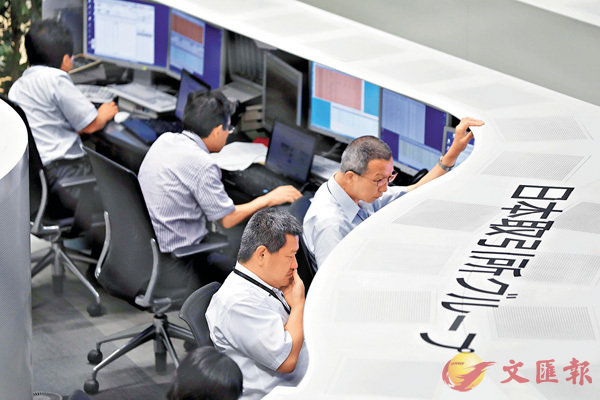 ■日本政府去年提出設立每月加班60小時的上限,預計明年4月起實行。圖為日本交易所人員正在工作。 資料圖片
■日本政府去年提出設立每月加班60小時的上限,預計明年4月起實行。圖為日本交易所人員正在工作。 資料圖片【原文】下文摘錄自香港《文匯報》2018年1月8日報道:
3年前日本有廣告商女員工因不堪工時超長自殺,事件引發社會反思加班(overtime work)文化。伴隨愈來愈多千禧世代(millennials)投入勞動市場,他們對舊有工作文化(workplace culture)不滿,僱主為適應這種改變調整公司政策,日本政府去年初更提出設立每月加班60小時的上限,違者(offender)將面臨處罰,預計明年4月起實行。
日本人工作時間普遍偏長,廣告業員工往往要長時間工作趕死線(deadline),會計界核數(auditing)部門的長工時亦為人詬病,故員工流失率(turnover rate)偏高。
日本人熱衷工作的態度,也令年輕新入職者備受同輩壓力(peer pressure),被迫大量加班工作。在舊有觀念裡,工作穩定(job stability)被視為首要考慮,只要薪金合理,即使工時過長,員工都會默默苦幹。
打工仔不敢較上司(seniors)更早下班,是日本職場長期存在的情況,結果導致員工長時間留在公司。
然而一眾80、90和00後的年輕人,不再追求工作穩定,而是希望獲得在職訓練(on-the-job training),並在工作與生活間取得平衡(work-life balance)。
每月加班最多60小時
根據日本勞工法(Labor Standards Act)第三十六條,如果勞資雙方簽署了協議,將容許勞方每月超時工作最多45小時,但資方可透過與僱員達成特別協議,迴避(evade)法例規定。新規實施嚴格限制,每月加班最多60小時,一旦超過時數,僱主須負上法律後果(legally bound)。
英國廣播公司(British Broadcasting Corporation, BBC)分析指,日本經濟增長愈趨依賴生產力(productivity)的提升,但企業不願投資科技促進生產力和容許員工在公司以外的地方工作。即使有企業限制工時,但沒其他相應措施作補充,結果是員工工作量(workload)不變,被迫提早上班和犧牲午飯時間來工作,或把事務帶回家。
英「零時合約」增 供工作彈性
隨着經濟模式轉變,近年興起容許僱傭雙方靈活安排工作的「零時合約」(zero-hour contract),打工仔可彈性上班,工資以工時計算,僱主亦毋須提供最低工時(minimum working hours)。
英國國家統計局(Office for National Statistics)數字顯示,以「零時合約」方式工作的人數,2016年增至破紀錄的91萬,較2015年增加10.5萬,增幅為14%。
有英國智庫(think tank)分析師認為,「零時合約」為學生、家長及必須照料家人的打工一族,提供工作彈性,並非所有同類合約都剝削工人。此外,亦可充當全職工作及退休(retirement)之間的過渡,避免退休人士(retiree)突然失去所有收入。
Japan tightens overtime law that takes effect in 2019
【譯文】The death of a female employee at an advertising company caused by overwork three years ago had aroused public attention to overtime work among the Japanese society. As millennials enter the labor market carrying with them a widely felt discontent about the old workplace culture, employers are forced to adjust their corporate policies as a response. The Japanese government even proposed capping overtime at 60 hours per month and imposing penalties on offenders early last year. The policies are expected to take effect from April 2019.
Most of the working class in Japan work too long. Employees of the advertising industry always push themselves to the limit to meet deadlines, so do those working in the auditing units in accountancy firms, which has caused a high turnover rate. Forced by peer pressure and social expectation on working attitude, new starters work around the clock as a token of dedication. Those who hold job stability paramount as in traditional corporate culture, as long as reasonably paid, would remain loyal regardless of how long they work.
It is known that Japanese workers seldom finish work earlier than their seniors. That's why they spend long hours at workplaces.
What the 80s, 90s and 00s generations seek, however, is no longer job stability, but on-the-job training and work-life balance.
Maximum of 60 hours per month
According to the Article 36 of the Labor Standards Act in Japan, if an agreement was signed between the employer and the employee, the person may work overtime for no more than 45 hours a month; but laws might be evaded by a specific consensus. The revised policy strictly caps overtime at 60 hours per month and the employer is legally bound.
The British Broadcasting Corporation (BBC) indicates that Japan's economic growth heavily depends on increasing productivity, but enterprises are reluctant to invest in relevant technologies that help boost it and allow employees to work outside the workplaces. Some might have limited working hours, but this is not supported by supplementary measures. Employees' workload remains unchanged. They would have to start working earlier and sacrifice lunch time, or even take business home.
Zero-hour contract gains traction
With a shift in economic model, the idea of "zero-hour contract", a form of employment that offers more flexibility in job arrangement for both sides, has emerged in recent years. Workers choose when to work and are paid on an hourly basis, while employers are not obliged to set minimum working hours. The UK's Office for National Statistics estimates that a record 910,000 people were hired as such in 2016-about 105,000 or 14% more than that in 2015.
Analysts of certain British think tanks believe that "zero-hour contract" provides flexibility for students, parents and workers who must take care of their families, and such kind of employment does not necessarily come at their expense. It may also help would-be retirees transit from full-time employment to retirement by avoiding sudden loss of income.■龐嘉儀
Q&A
1. 據政府統計處(Census and Statistics Department)最新資料顯示,全港工時最長的行業是?
2. 承上題,工時最短的行業是?
3. 據經濟合作暨發展組織OECD(Organization for Economic Co-operation and Development)統計,工時較長的亞洲國家及地區有哪些?
4. 承上題,全球哪些國家工時最短?
5. 全球哪個國家年假最多?
1. 住宿及飲食服務業
2. 資訊及通訊業
3. 新加坡、韓國、日本等
4. 德國
5. 奧地利、葡萄牙(每年均有35日年假)









